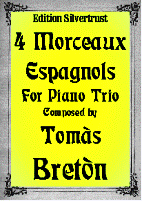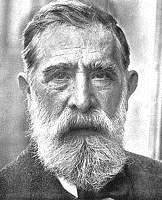Presents
Tomás Bretón
 |
 |
Click on Soundbites below |
Quatre Morceaux Espagnols for Piano Trio
The Quatre Morceaux, composed in 1912 when Bretón was 62, were dedicated to the famous Spanish cellist Pablo Casals. Beautiful, highly emotive and with fetching melodies, the music conjures up pictures of Old Spain. The four movements are entitled Danse Orientale, Boléro, Polo Gitano (in gypsy style) and Scherzo Andalou.
In no way does the chamber music of Tomás Bretón (1850-1923) deserve the neglect that it has received. His light operas, or as the Spanish call them Zarzuelas, are still performed in Spain. But even there, his fine chamber music has been not received the attention it deserves. Bretón was born in the Spanish city of Salamanca. His father, a baker, died when he was two. He started playing the violin at age eight and within two years was already playing in theater orchestras helping to support his family. When his mother moved to Madrid, he entered the conservatory there, studying violin and composition. During his studies and after he continued playing in theaters and restaurants. Finally fortune smiled on him at the age of 30 when he was awarded scholarships which allowed him to study in Rome and Vienna. Over the following years, he made his name as a composer of Zarzuelas and as a pioneer of serious Spanish opera. He eventually became director of the Madrid Conservatory as well as the Sociedad de Conciertos--the forerunner of the Madrid Symphony Orchestra. Bretón, although a passionate advocate of Spanish music, wished to put it on the same footing as German and Italian music and take it out of the music hall atmosphere of the Zarzuela. For this, his more serious music, his opera, orchestral works and chamber music were often attacked in his native Spain as not being Spanish enough. These attacks were basically made by ignorant critics who failed to realize that the kind of national music which could be placed in a light-hearted operetta could not be placed in more serious works in the same fashion. The truth was that, Bretón infused Spanish melodies into all of these works. Of course, as to the Four Morceaux Espagnols, there can be no question as to this.
Published in 1913, the wonderful music has been out of print for more than 75 years. It is a pleasure to reproduce it. We hope that both professionals and amateurs will take the time to acquaint themselves with this fine work
Parts: $29.95